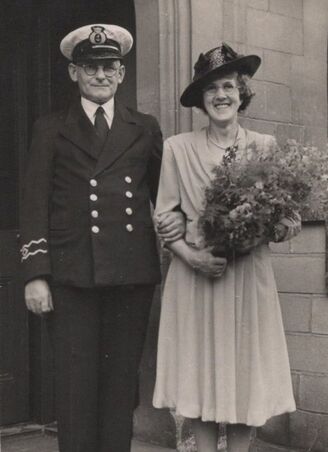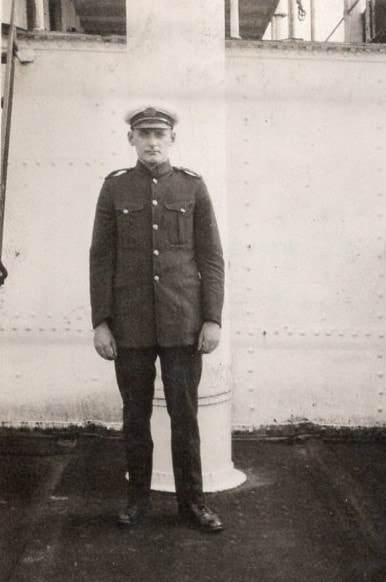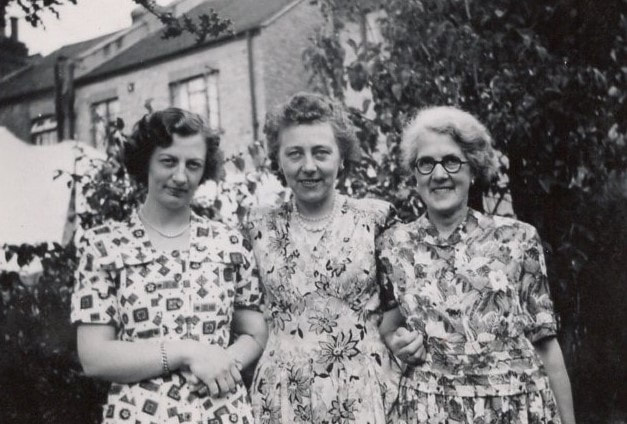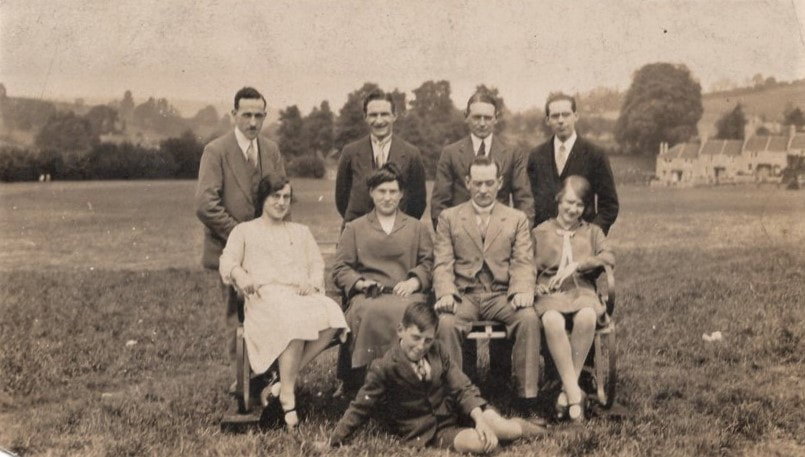|
Gertie Butt and Arthur Brooke Text John Brooke Flashman Photographs John Brooke Flashman July 2021 It is rare to have an article about a couple who married late in life, had no children and had little public recognition during their lifetimes. But their story mirrored thousands throughout Britain in the inter-war period. After the First World War many young women were unable to find husbands because of the number of young men killed in the conflict. Many were consigned to looking after their parents as unpaid carers. The men who returned after the conflict also had issues. Some were war-damaged, physically or mentally, others found that their lives were totally altered by their wartime experiences. Returning after four years of war they found they had changed and their earlier home life was no longer satisfactory. Right: Arthur Brooke and Gertie Butt on their wedding day, 26 July 1947 taken outside Mead Villa. The photograph was taken by John's father, Charles Flashman. |
|
Arthur Brooke Arthur Philip John Brooke (1895-1969) was the eldest son of John and Virginia Brooke. He was their only child to be born when they lived in Bath but, as with their other children, Arthur was brought up at Kingsdown in his parents’ bakery and sub-post office. Arthur probably left school at the age of fourteen and for a while assisted his father in the bakery at Kingsdown. In April 1912, two months after his seventeenth birthday, he sailed for Canada. Where he lived and what he did during his time there is not known. One possibility is that he joined his maternal uncle Gustin Aish who was employed as a telegraphist and lived in the Stewart River area of British Columbia. Arthur returned home shortly before the outbreak of war and enlisted in the Somerset Light Infantry, later transferring to the Hampshire Regiment. He spent most of his wartime service in Mesopotamia but, like many servicemen, he never discussed his wartime experiences. He was discharged from the army on 27 July 1919. Left: Arthur serving as radio officer on board one of his ships |
Once back in civilian life, he briefly held the post of Workhouse Master in Box, although this was probably more administrative than functional as the workhouse in Church Lane had long since been converted into flats. But he didn’t feel able to settle back into rural life in Box and sometime during 1920 he joined the merchant navy, spending the next eight years in service as a wireless telegraph officer. Following this, he ran a greengrocery business in Lymington, Hampshire but, finding it hard to settle, he re-joined the merchant navy as a ship’s radio officer in 1930. He remained in the merchant navy until taking retirement in 1953. During his career at sea, he visited many countries on all continents but he always maintained that the one country where he would be happy to settle was New Zealand.
Gertie Butt
Meanwhile, Gertrude Lydia Butt (1895-1977) had not strayed far from Kingsdown. She was the only daughter of Frederick Butt, farmer and stone haulier, and his wife Lydia nee Porter, who he had married in 1893. As a small boy I can remember being taken to visit them in their house at Kingsdown and being told by Frederick that he had left school when he was 11 (I must admit this left me with a feeling of some envy). He also told me that, when he was a young man out in the fields several miles from home, he had an accident in which he broke his thigh bone. He was carried home on a hurdle over rough ground, which was excruciatingly painful. I remember Gertie’s mother Lydia as a small white-haired old lady who radiated kindness and love.
Lydia was born in 1870 at Atworth. Her parents were John and Hester Porter and Lydia was one of five siblings. The parents worked in domestic service most of their lives with John employed as a groom and later as a domestic coachman. But they had an illustrious literary connection in their ranks, the historian Lord Alan Bullock. The connection was through Lydia’s elder sister Sarah who was born in 1867 at Atworth. In 1886 Sarah married a railway signalman by the name of Allan Bullock but the marriage was short-lived as Sarah died shortly after giving birth to a son, Frank Allen Bullock, born at Limpley Stoke in early 1886. At this point, Lydia stepped in. Although unmarried, she took care of the infant Frank until he was handed over to his maternal grandparents, John and Hester Porter, with whom he remained. Frank became a gardener and on 30 March 1912 he married a lady by the name of Edith Annie Brand at Clutton, Somerset. Their son, Alan Louis Charles Bullock (later Lord Bullock), was born at Trowbridge on 13 December 1914. The family later moved to Bradford, Yorkshire. Alan had an illustrious career as a historian and was created a life peer in 1976. My auntie Gertie always referred to Alan Bullock as her cousin although to be pedantic he was actually her first cousin once removed. I presume they must had met over the years although I have no evidence of this.
Gertie’s father’s family were Kingsdown residents and had run a haulage business on the Lower Kingsdown Road. The Butt family were well-known in the area, staunch supporters of the Methodist movement and respected local individuals in the stone industry. The only children from Frederick and Lydia’s marriage were Gertie and her brother Arthur who was born in 1898. Gertie was very much a country girl, assisting her father in his businesses in the stone industry and helping with animals on the smallholding. She was a competent violinist, pianist and organist who taught piano lessons. During the First World War, when male labour was short, Gertie had to undertake what would normally be regarded as mens’ work, including assisting her father in cutting Bath stone by hand. For many years she was the organist at Bath chapel, which involved a walk of four miles each way in her Sunday best and in all weathers. She walked because her father flatly forbade her to use the local tram service on a Sunday. Talking of chapels, I can remember as a very small boy attending a service at the Kingsdown Methodist Chapel. Gertie was playing the organ (more probably a harmonium) and I vividly recall the chapel heating being provided by a real coal fire.
By 1939 Gertie’s brother Arthur was next door but one to his parents, running a smallholding with his wife Blanche from their home at Hillside, Kingsdown. Meanwhile, Gertie was looking after her parents at Woodcroft, Kingsdown, near The Swan Inn, a role she had undertaken since she was fourteen.
Meanwhile, Gertrude Lydia Butt (1895-1977) had not strayed far from Kingsdown. She was the only daughter of Frederick Butt, farmer and stone haulier, and his wife Lydia nee Porter, who he had married in 1893. As a small boy I can remember being taken to visit them in their house at Kingsdown and being told by Frederick that he had left school when he was 11 (I must admit this left me with a feeling of some envy). He also told me that, when he was a young man out in the fields several miles from home, he had an accident in which he broke his thigh bone. He was carried home on a hurdle over rough ground, which was excruciatingly painful. I remember Gertie’s mother Lydia as a small white-haired old lady who radiated kindness and love.
Lydia was born in 1870 at Atworth. Her parents were John and Hester Porter and Lydia was one of five siblings. The parents worked in domestic service most of their lives with John employed as a groom and later as a domestic coachman. But they had an illustrious literary connection in their ranks, the historian Lord Alan Bullock. The connection was through Lydia’s elder sister Sarah who was born in 1867 at Atworth. In 1886 Sarah married a railway signalman by the name of Allan Bullock but the marriage was short-lived as Sarah died shortly after giving birth to a son, Frank Allen Bullock, born at Limpley Stoke in early 1886. At this point, Lydia stepped in. Although unmarried, she took care of the infant Frank until he was handed over to his maternal grandparents, John and Hester Porter, with whom he remained. Frank became a gardener and on 30 March 1912 he married a lady by the name of Edith Annie Brand at Clutton, Somerset. Their son, Alan Louis Charles Bullock (later Lord Bullock), was born at Trowbridge on 13 December 1914. The family later moved to Bradford, Yorkshire. Alan had an illustrious career as a historian and was created a life peer in 1976. My auntie Gertie always referred to Alan Bullock as her cousin although to be pedantic he was actually her first cousin once removed. I presume they must had met over the years although I have no evidence of this.
Gertie’s father’s family were Kingsdown residents and had run a haulage business on the Lower Kingsdown Road. The Butt family were well-known in the area, staunch supporters of the Methodist movement and respected local individuals in the stone industry. The only children from Frederick and Lydia’s marriage were Gertie and her brother Arthur who was born in 1898. Gertie was very much a country girl, assisting her father in his businesses in the stone industry and helping with animals on the smallholding. She was a competent violinist, pianist and organist who taught piano lessons. During the First World War, when male labour was short, Gertie had to undertake what would normally be regarded as mens’ work, including assisting her father in cutting Bath stone by hand. For many years she was the organist at Bath chapel, which involved a walk of four miles each way in her Sunday best and in all weathers. She walked because her father flatly forbade her to use the local tram service on a Sunday. Talking of chapels, I can remember as a very small boy attending a service at the Kingsdown Methodist Chapel. Gertie was playing the organ (more probably a harmonium) and I vividly recall the chapel heating being provided by a real coal fire.
By 1939 Gertie’s brother Arthur was next door but one to his parents, running a smallholding with his wife Blanche from their home at Hillside, Kingsdown. Meanwhile, Gertie was looking after her parents at Woodcroft, Kingsdown, near The Swan Inn, a role she had undertaken since she was fourteen.
Disaster Looming
After her mother’s death in 1945, Gertie became increasingly concerned about her future, particularly after her father Frederick had informed her that he intended to bequeath the family home jointly to Gertie and her brother Arthur Butt. Gertie was a spinster on the wrong side of 50 with no savings and no financial support, having cared for her parents all of her life. This was in contrast to her brother who already had his own house and business.
Gertie’s future was so uncertain that she sought advice from a person she could trust, her father’s old friend John Brooke. Fully appreciative of Gertie’s situation, John visited Frederick and suggested that he change his will to leave the house to Gertie outright. This he did and Gertie remained in the Kingsdown property looking after her father until his death on 14 January 1947.
As luck would have it, in either January or February 1947 John Brooke’s son Arthur Brooke came home on leave from the merchant navy and embarked on a round of visits to friends in the area. On arrival at Gertie’s house, he found her in a distressed condition, fearful of what the future might hold for her. We shall never know whether Arthur already had this in mind when he went to visit her but he proposed to Gertie there and then and she accepted.
There is no doubt that John Brooke, a man of the utmost integrity, gave what he thought was good and fair advice to Frederick Butt but Arthur’s action in marrying Gertie put him in a very awkward position. The relationship between father and son came under severe strain and, even worse, Gertie’s marriage caused a rift between her and her brother Arthur Butt and his wife Blanche. Gertie did manage to persuade her brother Arthur to give her away at the wedding which took place on 26 July 1947 at Box Methodist Chapel but, on the day, Blanche flatly refused to attend the ceremony and, worse still, forbade her husband Arthur from doing so. The role of giving away the bride was undertaken at very short notice by Harry Perry, who I believe may have been Gertie’s cousin. As far as I know, Harry lived at Kingsdown all his life and I recall visiting him at his home, probably in the mid-1940s. He had a wife and three children, all girls.
Both Arthur and Gertie were fifty-two-years-old and they had known one another all their lives, the two families having a very close friendship over many years. It was too late for there to be any children from the marriage and Arthur continued his career in the merchant navy whilst Gertie sold the house and moved to Box as a housekeeper and live-in companion help to Mr and Miss Vezey at 1 Mead Villas. On his father’s death in 1963, Arthur took over 2 Mead Villas and retired from the merchant navy. He developed thrombosis in his leg which had to be amputated and was often housebound until his death in May 1969. Gertie continued to live at 2 Mead Villas until her death on 22 March 1977.
After her mother’s death in 1945, Gertie became increasingly concerned about her future, particularly after her father Frederick had informed her that he intended to bequeath the family home jointly to Gertie and her brother Arthur Butt. Gertie was a spinster on the wrong side of 50 with no savings and no financial support, having cared for her parents all of her life. This was in contrast to her brother who already had his own house and business.
Gertie’s future was so uncertain that she sought advice from a person she could trust, her father’s old friend John Brooke. Fully appreciative of Gertie’s situation, John visited Frederick and suggested that he change his will to leave the house to Gertie outright. This he did and Gertie remained in the Kingsdown property looking after her father until his death on 14 January 1947.
As luck would have it, in either January or February 1947 John Brooke’s son Arthur Brooke came home on leave from the merchant navy and embarked on a round of visits to friends in the area. On arrival at Gertie’s house, he found her in a distressed condition, fearful of what the future might hold for her. We shall never know whether Arthur already had this in mind when he went to visit her but he proposed to Gertie there and then and she accepted.
There is no doubt that John Brooke, a man of the utmost integrity, gave what he thought was good and fair advice to Frederick Butt but Arthur’s action in marrying Gertie put him in a very awkward position. The relationship between father and son came under severe strain and, even worse, Gertie’s marriage caused a rift between her and her brother Arthur Butt and his wife Blanche. Gertie did manage to persuade her brother Arthur to give her away at the wedding which took place on 26 July 1947 at Box Methodist Chapel but, on the day, Blanche flatly refused to attend the ceremony and, worse still, forbade her husband Arthur from doing so. The role of giving away the bride was undertaken at very short notice by Harry Perry, who I believe may have been Gertie’s cousin. As far as I know, Harry lived at Kingsdown all his life and I recall visiting him at his home, probably in the mid-1940s. He had a wife and three children, all girls.
Both Arthur and Gertie were fifty-two-years-old and they had known one another all their lives, the two families having a very close friendship over many years. It was too late for there to be any children from the marriage and Arthur continued his career in the merchant navy whilst Gertie sold the house and moved to Box as a housekeeper and live-in companion help to Mr and Miss Vezey at 1 Mead Villas. On his father’s death in 1963, Arthur took over 2 Mead Villas and retired from the merchant navy. He developed thrombosis in his leg which had to be amputated and was often housebound until his death in May 1969. Gertie continued to live at 2 Mead Villas until her death on 22 March 1977.
Remembering Gertie Brooke (nee Butt)
Gertie Butt was a very competent needlewoman. She gave my mother a beautifully embroidered tablecloth as a wedding present which was in the family for many years but, with the passage of time, it probably now no longer exists. She was also a very competent cook.
I remember my grandfather John telling me that once, when she was a young girl, she was chosen as the Queen of the May; he added that in those days Gertie was very attractive. She was also a very kind person who took me under her wing when I was packed off to Box whilst my mother and sister went to France for two weeks to visit my sister's penfriend in Cognac. There was a glut of plums that summer (1952) and I remember plums being sold in Bath for one penny a pound (old money of course).
After the death of Miss Vezey, the Vezey family told Gertie she could have anything she wanted from the house as a memento and a token of their gratitude for all she had done for Miss Vezey and her brother, who had shared the house with her. Amongst the items offered was a box of gold sovereigns but Gertie ended up taking something quite cheap and insignificant. When I asked her why she hadn’t chosen the sovereigns, she said Oh, I didn't like to. That was so typical of her.
Gertie Butt was a very competent needlewoman. She gave my mother a beautifully embroidered tablecloth as a wedding present which was in the family for many years but, with the passage of time, it probably now no longer exists. She was also a very competent cook.
I remember my grandfather John telling me that once, when she was a young girl, she was chosen as the Queen of the May; he added that in those days Gertie was very attractive. She was also a very kind person who took me under her wing when I was packed off to Box whilst my mother and sister went to France for two weeks to visit my sister's penfriend in Cognac. There was a glut of plums that summer (1952) and I remember plums being sold in Bath for one penny a pound (old money of course).
After the death of Miss Vezey, the Vezey family told Gertie she could have anything she wanted from the house as a memento and a token of their gratitude for all she had done for Miss Vezey and her brother, who had shared the house with her. Amongst the items offered was a box of gold sovereigns but Gertie ended up taking something quite cheap and insignificant. When I asked her why she hadn’t chosen the sovereigns, she said Oh, I didn't like to. That was so typical of her.
From today’s perspective, the lives of Arthur and Gertie were isolated – one of them restricted to looking after parents until middle-age and the other at sea for months on end. Their experience of the world was limited; now we have international transport, television and the world-wide web. This may not be a bad thing - Lord Bullock’s history of Adolph Hitler “Hitler: A Study in Tyranny” demonstrates the problems which can arise when someone distorts a world vision with no regard for the benefits of a small but caring local society, such as that which Gertie and Arthur had experienced in Box.
Butt Family Connection with Bullocks
John Porter (1833-), groom and later coachman, married Hester Porter (1837-) in April 1856. Children:
William D (1862-), gardener;
Sarah Jane (1867-1886) who married Allan Bullock;
Lydia Hester (1870-) who married Frederick Butt;
Frank HJ (1873-);
Arthur E (1876-).
Sarah Jane (1867-) married Allan Bullock, railway signalman. Child: Frank Allen Bullock (1886-). Frank, a gardener, married Edith Annie Brand on 30 March 1912. Their son, Alan Louis Charles Bullock, later Lord Bullock (13 December 1914-2004).
Porter Family Tree
Lydia Hester Porter (1870-) married Frederick Butt in 1893. Children:
Gertrude Lydia (1895-1977) who married Arthur Brooke; and
Arthur Frederick (1897-1970) who married Blanche Hilda Butler (1900-1981).
Brooke Family Tree
See John Brooke at Kingsdown
John Porter (1833-), groom and later coachman, married Hester Porter (1837-) in April 1856. Children:
William D (1862-), gardener;
Sarah Jane (1867-1886) who married Allan Bullock;
Lydia Hester (1870-) who married Frederick Butt;
Frank HJ (1873-);
Arthur E (1876-).
Sarah Jane (1867-) married Allan Bullock, railway signalman. Child: Frank Allen Bullock (1886-). Frank, a gardener, married Edith Annie Brand on 30 March 1912. Their son, Alan Louis Charles Bullock, later Lord Bullock (13 December 1914-2004).
Porter Family Tree
Lydia Hester Porter (1870-) married Frederick Butt in 1893. Children:
Gertrude Lydia (1895-1977) who married Arthur Brooke; and
Arthur Frederick (1897-1970) who married Blanche Hilda Butler (1900-1981).
Brooke Family Tree
See John Brooke at Kingsdown



